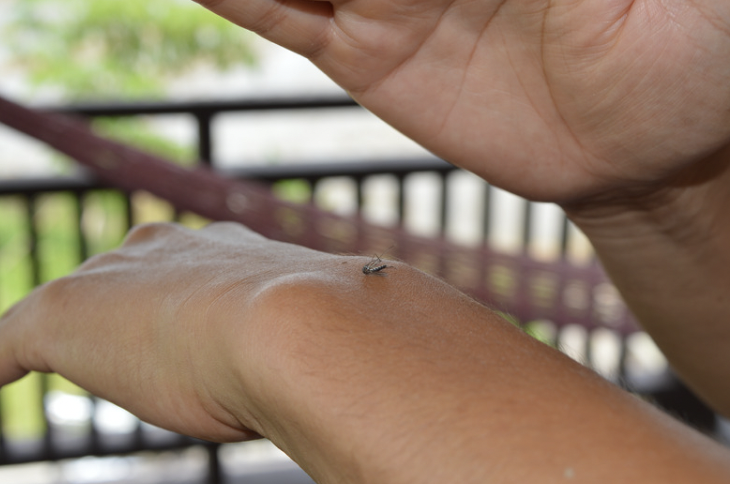
Layanan IV Hangover di Bali: Kapan Cocok dan Kapan Harus Periksa Dulu
Bangun dengan hangover parah di Bali? Matahari Januari 2026 baru saja mengintip di balik rimbunnya pepohonan di villa Anda di
Ah, another day in paradise! You’ve just nailed the ultimate Bali bucket list: conquered those emerald rice terraces, scored the perfect sunset snap, and now you’re lounging by your villa’s infinity pool. Life’s a dream, right?
But wait—what’s that? The tiniest of terrorists has just launched a sneak attack on your arm. Welcome to the dark side of paradise: Mosquito Bites in Bali!
Let’s face it, these tiny vampires are like the uninvited guests at Bali’s never-ending tropical party. But before you start planning your vacation around mosquito-dodging acrobatics, take a deep breath. We’re about to arm you with the ultimate mozzie survival guide.
Grab your bug spray and let’s embark on this epic quest to reclaim your tropical paradise from the tiny terrors. By the end, you’ll be ready to enjoy every moment of your Bali bliss—itch-free!
Mosquito bites in Bali are more than just an itchy annoyance. These bites can transmit diseases like dengue fever, chikungunya, Zika virus, and, although less common, malaria. Understanding these risks and how to protect yourself is crucial to enjoying a safe and healthy stay in Bali.
Dengue Fever and Chikungunya: Both of these viral infections are common in Bali and are transmitted by the Aedes mosquito. Symptoms can range from mild fever and joint pain to more severe complications, particularly with dengue, which can develop into Dengue Hemorrhagic Fever (DHF) or Dengue Shock Syndrome (DSS).
Zika Virus: Although rare, Zika is another mosquito-borne illness found in Bali. It’s particularly concerning for pregnant women due to the risk of birth defects.
Malaria: While Bali is not a high-risk area for malaria, it’s not completely malaria-free. Malaria is primarily found in more remote areas, but it’s still wise to take preventive measures, especially if you plan on traveling to these regions.

Preventing mosquito bites is the best way to avoid these diseases. Here are some practical tips to keep the bites at bay:
Despite your best efforts, mosquito bites can still happen. Here’s how to treat them effectively:

Dengue Fever: Dengue is one of the most common mosquito-borne diseases in Bali. It’s crucial to seek medical attention if you experience symptoms like a high fever, severe headache, or a rash after being bitten by a mosquito. Early detection is key to preventing severe complications. Book a lab test at Trishnanda Care Centre for a quick and accurate diagnosis.
Chikungunya: While chikungunya shares many symptoms with dengue, such as fever and joint pain, the joint pain is typically more severe and can last for weeks or even months. The Trishnanda Care Centre can provide the necessary medical care and advice for managing these symptoms.
Malaria: Although less common in Bali, malaria is still a risk, particularly in more remote areas. If you’re planning to travel to these regions, consider discussing malaria prevention strategies with your healthcare provider before your trip. Trishnanda Care Centre offers vaccinations and preventive measures to help protect you from malaria and other mosquito-borne diseases.
If you’re bitten by a mosquito in Bali, there’s a risk of contracting diseases like dengue fever, chikungunya, Zika virus, or, in rare cases, malaria. If you develop symptoms such as fever, joint pain, or a rash after being bitten, it’s important to seek medical attention immediately. Contact Trishnanda Care Centre for doctor services and lab tests to determine if you’ve contracted a mosquito-borne illness.
The likelihood of contracting dengue in Bali is higher during the rainy season when mosquitoes are more prevalent. However, with proper precautions, such as using insect repellent and wearing protective clothing, you can significantly reduce your risk.
Mosquitoes in Bali can carry several diseases, including dengue fever, chikungunya, Zika virus, and malaria. While dengue and chikungunya are the most common, it’s important to be aware of the symptoms of these diseases and seek medical attention if you suspect you’ve been infected. Book a lab test to confirm your diagnosis.
To get rid of mosquito bites in Bali, start by cleaning the bite with soap and water. Apply a cold compress to reduce swelling and itching, and use topical treatments like hydrocortisone cream or calamine lotion. If you’re experiencing severe itching, consider taking an oral antihistamine. If the bite becomes infected or if you develop symptoms of a mosquito-borne illness, seek medical attention from Trishnanda Care Centre.
Not all mosquitoes in Bali carry dengue fever. The disease is primarily transmitted by the Aedes mosquito, which is more active during the day. However, it’s still important to take preventive measures to protect yourself from mosquito bites.
Malaria is less common in Bali compared to other mosquito-borne diseases, but it is still present in some remote areas. If you plan to travel to these regions, it’s wise to discuss malaria prevention with your healthcare provider and consider taking preventive measures. Vaccinations and lab tests are available at Trishnanda Care Centre.
It depends on your health and preparedness. If you decide to travel, take extra precautions to avoid mosquito bites, such as using repellent and wearing protective clothing. If you’re in doubt, contact the team at Trishnanda Care Centre for guidance.
Yes, you can get vaccinated against certain mosquito-borne diseases, such as yellow fever, before traveling. While there isn’t a widely available vaccine for dengue or chikungunya, preventive measures like vaccinations against other diseases are available at Trishnanda Care Centre.
To reduce the risk, use insect repellent, wear long sleeves and pants, stay indoors during peak mosquito activity hours, and eliminate standing water around your accommodation. For added protection, consider consulting with Trishnanda Care Centre for preventive measures and vaccinations.

Bangun dengan hangover parah di Bali? Matahari Januari 2026 baru saja mengintip di balik rimbunnya pepohonan di villa Anda di

Kapan waktu terbaik untuk melakukan tes NS1? Tes NS1 (Dengue Early Antigen) paling akurat dilakukan dalam 1 hingga 3 hari
Contact Our Doctor Now